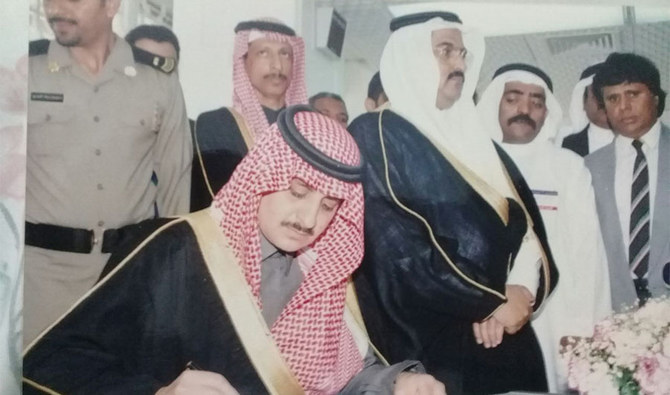KARACHI: A retired, long-time Pakistani employee of Saudi Airlines said Pakistanis had a role to play in Saudi Arabia’s “brilliant transformation,” from the 70's to the present day, and that it was primarily due to the Kingdom’s professional culture of merit and teamwork.
Shujaat Hussain Hamidi came to Saudi Arabia following the OIC summit of 1974, after which Saudi King Faisal, on the request of then Prime Minister Zulfiqar Ali Bhutto, offered a large number of visas to Pakistanis. Subsequently, Hamidi became one of the thousands of skilled and professional Pakistanis who moved to Saudi Arabia for work.

Shujaat Hussain Hamidi, a former general manager sales of the Saudi Airlines, is talking to Arab News at his residence in Karachi on November 17, 2019 (AN Photo)
“When I first reached the kingdom it was a desert with few roads and infrastructure. Saudi Arabia’s visionary leadership, however, turned it into a modern and progressive country,” he said, and added: “I may not be wrong to say that Pakistani professionals and the great Saudi values of professionalism and merit...played a role in this brilliant transformation.”

In this file photo, Station Manager Saudi Airlines Tabuk is giving away best of sales award to the airline’s official Shujaat Hussain Hamidi in 1984 (Photo by Shujaat Hussain Hamidi)
In the 70's, nearly 2,000 Pakistanis joined Saudi Airlines, founded in 1945, in different capacities as aircraft engineers, technicians, ground services staff, passenger handlers, pilots, stewards, and stewardesses.
“When I joined Saudi Airlines in 1974, it had a few small aircrafts flying to a few stations. Today it has a massive infrastructure with a fleet of 154 planes flying to more than 95 destinations and is considered one of the world’s most successful airlines,” Hamidi, who retired as a senior regional manager in 2010, told Arab News.

In this file photo, Shujaat Hussain Hamidi, a former official of the Saudi Airlines, can be seen with Governor Tabuk prince Abdul Majeed Bin Abdul Aziz Al Saud on the inauguration of newly added airbus A-300 into the fleet at Tabuk Airport in 1980 (Photo by Shujaat Hussain Hamidi)
Photo4
“The credit goes to a culture of merit, professionalism, dedication, and teamwork,” he said and added that Pakistani professionals had played their own role in the Kingdom’s development.
“Pakistanis made up the majority of pilots for the airline (Saudi Airlines) in the 70’s,” Hamidi added.

In this file photo, Shujaat Hussain Hamidi can be seen attending the board of directors’ meeting of the Saudi Arabian Airlines in 1995 (Photo by Shujaat Hussain Hamidi)
Now, as he lives out his retirement in Pakistan’s sprawling southern metropolis of Karachi with his family, Hamidi said he still misses his life in Saudi Arabia.
“There was always a sense of job security, ease of mind and a tension-free life,” Hamidi said, and added Saudi Arabia was so safe, he could leave the country for vacations with his home unlocked.

In this file photo, Shujaat Hussain Hamidi is receiving award from former station manager at Tabuk city of Saudi Arabia in 1979 (Photo by Shujaat Hussain Hamidi)
“We would take our necessary luggage and leave for Pakistan without any worries about the valuables we left at our home in Saudi Arabia,” Hamidi recalls nostalgically.
As president of the Pakistan welfare society, Hamidi said he had also had the chance to interact with envoys and Saudi officials for discussions on how to resolve the problems of the Pakistani expat community, and said he was amazed at the compassion Saudis had for Pakistanis.
“I am witness to cases in which Saudi officials had spent one million riyals on the treatment of one ailing Pakistani,” he said.
“This is a testament of the strong bonds these two nations have,” Hamidi said and added that even though the government-to-government ties between Pakistan and Saudi Arabia were always strong, the bond between the masses was most unique.

In this undated photo, Shujaat Hussain Hamidi (R) is seated at the stage during an event on the occasion of the birthday of Indian Muslim leader Sir Syed Ahmed Khan being organized by former students of Aligarh Muslim University India at Tabuk, Saudi Arabia (Photo by Shujaat Hussain Hamidi)
“I remember the day when Pakistan conducted underground nuclear tests in May 1998,” Hamidi said.
“The Saudis were very happily celebrating. It was like their own country had become a nuclear power.”















